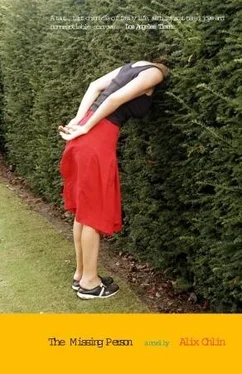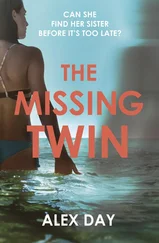On one of our hikes, Syc came bounding back onto the trail, his tail wagging like crazy, with something in his mouth. My father bent down, sweat loosening his glasses from the bridge of his nose, and said his name softly. Syc just stood there, wagging. My father gently pried his jaws apart and a pale-gray rabbit dropped onto the ground, shiny ropes of dog saliva coating his fur. Wylie and I stood there looking at it. Then my father put the rabbit behind a tree and shooed Syc away. Wylie asked to keep it, but my dad said no, so he pouted all the way home. But I’d seen what Wylie didn’t: that the rabbit just lay there, stiff, on the ground.
The shade had widened over the landing. In front of me, the stray dog snapped up a piece of garbage in somebody’s yard, seemed dubious about it, then moved on. I watched it leave, shaking my head at myself. It had been over ten years since I’d gone on a hike of any kind. But if your brother held wilderness all-important in an overly civilized world, why on earth wait for him at an apartment building? Why would you, unless you didn’t really want to find him in the first place? I decided I was an idiot and got back into the car.
I could remember only that one trail, which started in the western foothills by a water reservoir, a round white container that always looked to me like an oversized aspirin the mountain was trying, year after year, to swallow. At the trailhead, two mountain bikers in fluorescent gear were squirting energy food from tubes into their mouths. It was a weekday afternoon, and aside from a single jogger far ahead up the trail, there was no one else around: just the sky and the sun and the arid ground, with dry husks of burnt-out cactus making the skeleton shapes of bushes.
I started walking. Where the dusty foothills pulled steeply upwards into a bit more greenery, I saw the jogger disappear around a bend. Now there was really no one around. Gradually the trail took on a malevolent air. The dead cacti rustled and whispered; invisible animals scurried underneath. Fifteen minutes later I was exhausted. I could walk for hours on city blocks in high-heeled boots, but a quick stroll at Albuquerque elevation was killing me.
On a rock barely shaded by a juniper tree, I sat down and wiped my forehead with my T-shirt. “I hate being hot,” I said out loud. I hated being thirsty, too. I vaguely recalled there was some kind of stream on this trail, although maybe you weren’t supposed to drink from it because of the bacteria. Or was that somewhere else? I was ignorant; my feet hurt. I thought about Wylie spending weeks at a time in the mountains, philosophizing or thinking or whatever it was that he did out here, and felt a profound wash of affection, even gratitude, for the attributes of civilized life, for apartments and stoplights and magazines and the steam that issued from manholes on the streets of New York.
But none of that was within my reach just now, so I stood up again. Somewhere up ahead was the cave where Wylie and I used to pretend, over lunch, that we were prehistoric man, if prehistoric man had had access to peanut-butter sandwiches and Nilla wafers. My father often began those hikes with a distant, preoccupied air, speaking about current events and the weather as if we were strangers he’d just happened to fall in step with; but gradually he’d relax into his more fatherly self, telling stories and jokes, every once in a while ruffling Wylie’s hair. I always thought that it took him a while to get used to his family again, not because he didn’t like us but because during the week, when he was at work, he just didn’t think about us that much. We weren’t the central focus of his life, and he was capable of forgetting us. When he died I thought: if he’d cared a little more, he would have fought harder to stay.
Birds muttered in the low bushes by the side of the trail. The sun shone on the back of my neck, the heat a pressure as real and finite as an iron flat on your skin. My shoes were covered in brown dust. I climbed up through rocky crags, heading up switchbacks, turning back and forth like a goat. I kept thinking the cave would be around the next corner, but it never was. On another rock I rested again, this time looking back toward the city, flat and undistinguished below me: the gray acreage of parking lots, the beige hulks of new malls, the streets hectic with tiny cars. In the distance I could see the small peak of Mount Taylor, floating in the desert like an island rising from a brown sea. My throat and feet and neck were dry and sore and sunburned, respectively.
I gave myself ten more minutes and finally reached the cave, though it was less the cave of my memory than a rocky overhang with the remains of a fire below it, charred rocks, scattered trash and paper, old beer cans and condom wrappers. It was a ready-made antidote for childhood nostalgia. I sat down in the shade, leaned my head against the rocky wall, and passed out.
When I opened my eyes the jogger I’d seen earlier was standing over me holding out a bottle of water. It was Angus Beam. I was almost positive I was dreaming. His skin shone thickly with sweat. He was wearing a light-blue T-shirt that was soaked and translucent, sweatpants, combat boots, and a Panama hat. His arms and neck were the color of persimmons.
“Drink this,” he said.
I grabbed the bottle and drank almost half of it, undeterred by its weird taste, which was both chemical and citrusy. A layer of dust had somehow settled on my tongue as I slept.
He crouched next to me, balancing lightly on his heels, and squinted at my face. “You look terrible.”
“What are you doing here?”
“Walking around,” he said. “Wearing a hat and carrying water. Which is more than I can say for some people.”
“Don’t start.”
“Water is the key to life here in the arid Southwest.”
“Yeah, I know.”
“Without it we’d all perish.”
“I said I know,” I said. “Can I have some more?”
I felt nauseous and stupid and annoyed. Every time I looked for Wylie, I wound up with this character instead. He took a folded handkerchief out of his pocket, dampened it with water, and gently wiped my forehead and cheeks. “Can you walk? Otherwise I’ll carry you.”
“Don’t even think about it.” I stood up and immediately sat down again. My calves were knotted and cramped, and some floating squares of color — red, blue, green, purple— hovered weirdly in my field of vision. When I pressed a hand to my face, one was hot and the other ice cold, but for a second I couldn’t tell which was which.
“Let me help you,” he said.
It took twice as long to get back down the trail as it did to climb up. I leaned heavily against his shoulder and stopped often to drink water, and by the time we got to the trailhead I was feeling almost normal. The sun was lower now, drooping densely in the flat sky, and hikers with dogs and children spilled from their cars in the parking lot. I could see far below us the sparkle of traffic on the highway. I had no idea how long I’d been on the trail. Without saying anything Angus steered me to the Caprice, took the keys I offered, opened the door, and sat me down in the driver’s seat. Then he leaned against the door and asked if I was all right to drive. Suddenly his smell hit me: the stinky pheronomic nastiness of male sweat, plus that chemical odor I’d noticed before, and, on top of that, a general odor that was strangely but recognizably clean. It was impossible, but he smelled like water.
“I think so,” I said. “Where’s your car?”
“I walked.”
“From Wylie’s apartment?”
“As modes of transportation go, it’s both safe and reliable,” he said. “Listen, would you care for a drink?”
“What time is it?”
“It’s five o’clock somewhere,” he said, and smiled. Under the brim of his hat, sweat was gathering in drops and preparing to trickle down his face.
Читать дальше












